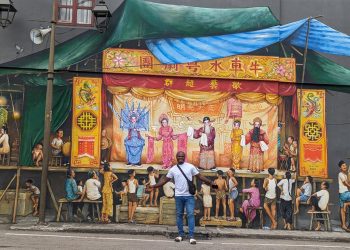Singapore, the Lion City, is renowned for its stunning skyline, bustling street markets, and vibrant culture. It’s also famous for being a haven for food lovers, offering a delightful array of culinary experiences. Amidst all the gastronomic delights, there’s one fruit that stands out for both its allure and notoriety – the durian.
For those unfamiliar with durian, it’s a unique tropical fruit with a formidable reputation. Often hailed as the “king of fruits,” durian is cherished by many for its rich, custard-like flesh and distinctive flavor. However, it also carries a divisive trait that has earned it a fair share of critics – its potent odor.
Durian’s aroma has been described in various ways, from pungent and overpowering to sweet and fragrant. Depending on your palate and tolerance for strong scents, you may either find it enticing or repulsive. This aromatic paradox has sparked a debate that transcends borders.
Durian in Singapore: A Love-Hate Relationship
Singaporeans have a deep-rooted affection for durian. This spiky, green fruit has found its way into the hearts and palates of locals, becoming an integral part of the country’s culinary identity. The market for durian in Singapore is robust, with numerous stalls and vendors offering a wide range of durian varieties.
However, the love for durian in Singapore comes with a caveat – a pervasive ban on consuming the fruit in public places. The smell of durian is so intense that it’s deemed disruptive and unpleasant in enclosed spaces. As a result, signs on public transport, hotels, hostels, and other establishments make it abundantly clear: eating or even carrying durian comes with a fine.
One of the most noteworthy aspects of the durian ban in Singapore is its inclusion in the “no eating or drinking” rules on public transport. While many cities have similar regulations to maintain cleanliness and hygiene, Singapore goes the extra mile by explicitly naming durian. This demonstrates just how seriously the country takes the matter.
The Reason Behind the Ban: Durian’s Overpowering Aroma
The ban on durian consumption in public spaces stems from its distinctive smell, which can be overwhelmingly strong. To some, it’s an exotic and enticing fragrance that whets the appetite. To others, it’s an overpowering odor that can be quite challenging to tolerate.
Singapore, known for its cleanliness and orderliness, strives to ensure that all residents and visitors enjoy a pleasant and comfortable environment. In a densely populated city where public spaces are shared by diverse communities, maintaining a harmonious coexistence is paramount.
The durian ban isn’t confined to public transport; it extends to many hotels and hostels as well. Some establishments explicitly forbid guests from bringing durians into their rooms. The reason is simple – the lingering smell can be challenging to remove, affecting subsequent guests’ experiences.
Durian’s Inescapable Allure
Despite the restrictions, durian remains an irresistible fruit for many. Its rich, creamy flesh is packed with nutrients, making it a beloved treat. In Singapore, you can explore dedicated durian stalls and indulge in a variety of durian-based desserts and dishes, from durian ice cream to durian pastries.
Durian’s reputation as a love-it-or-hate-it fruit is a testament to the diversity of culinary experiences around the world. While it may be forbidden in certain public spaces in Singapore due to its potent aroma, it continues to thrive in the hearts and palates of those who appreciate its unique flavor.
So, the next time you find yourself in Singapore and catch a whiff of that unmistakable scent, remember the durian’s complex love-hate relationship with this vibrant city. Whether you embrace it with open arms or keep your distance, durian is undeniably a fruit that sparks conversation and evokes strong feelings.
Still have some travel questions? Ask in our Travel WhatsApp Group.








